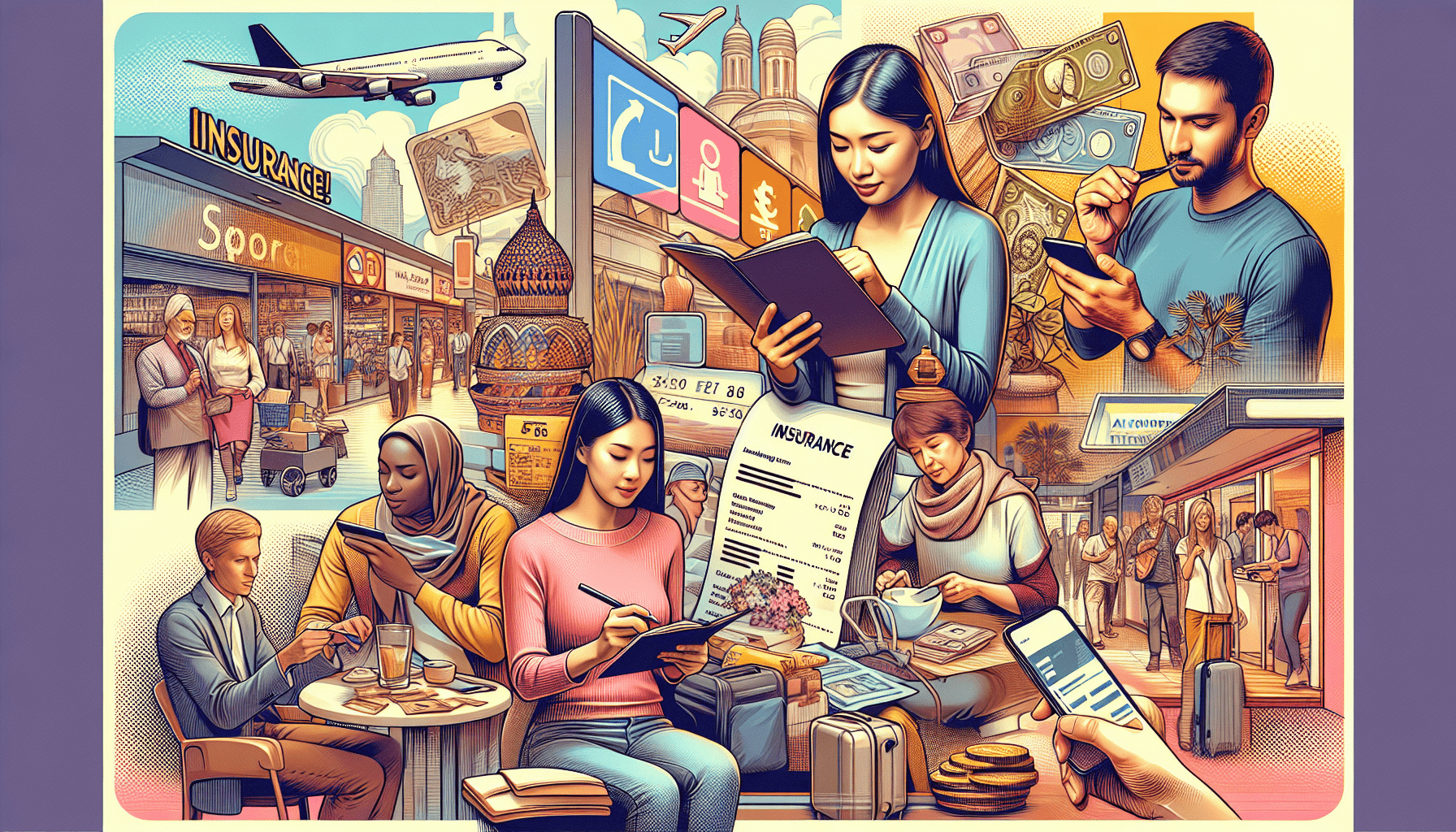
Frequent travelers, think of financial management as your guardian angel, always looking out for you! Regularly keeping tabs on your budget not only saves you money in the short term, but it also enables you to travel more often and explore new destinations without breaking the bank.
We’ve all heard those terrifying tales of trips gone wrong – lost luggage, stolen wallets, and unexpected expenses piling up. Poor financial planning can make these situations even worse, leaving you in a foreign country with no fallback.
Do you randomly plan trips and then frantically scramble to gather funds? Let’s change that, shall we? Creating a budget plan before you travel gives you a clear picture of your finances, helping you to avoid unnecessary stress while enjoying your journey.
Think of assessing your finances as giving your bank account a health check – you wouldn’t run a marathon without ensuring you’re in good health, right? Similarly, understanding your financial situation before traveling helps you set a budget that won’t leave you gasping for breath.
Setting a travel budget isn’t about picking a random figure out of the air. It involves considering factors like your destination’s cost of living, accommodation expenses, and never forgetting those often overlooked expenses like local transportation or tipping.
Nobody likes to miss out on a great deal, right? Identifying your essential expenses helps you allocate enough funds, while recognizing cost-saving opportunities allows you to avail of discounts and deals, saving you money for that extra scoop of gelato or a memorable local experience.
Imagine the horror of losing your wallet full of cash while on a trek or the hassles of finding a reliable exchange bureau at midnight. Don’t let these nightmares become a reality! Let’s talk about effective ways of managing your travel money.
While cash might seem like the easiest option, it’s also the riskiest. An unfortunate pickpocket incident or accidentally leaving your wallet behind can mean the end of your funds, leaving you stranded.
Say hello to your new travel buddy – travel-friendly credit cards! They often come with benefits like no foreign transaction fees, reward points, and can be easily replaced if lost or stolen. Plus, if your card offers travel insurance, that’s another win!
Making sense of exchange rates can feel like cracking the code to an unsolved mystery. But understanding them can help you plan better and avoid paying more than necessary. After all, wouldn’t you rather spend that money on a spontaneous adventure?
Welcome to the 21st century, where managing finances during travel doesn’t mean hoarding receipts or keeping a money belt strapped to your belly! From budgeting apps to online banking, technology has made travel finance management a breeze.
Papercuts from dealing with receipts and frustrating notebook entries? Say no more! Download a reliable travel budget app and let technology do the work. These apps are convenient for tracking expenses, setting limits and even converting currencies.
Lost cards, running out of cash, or excess transaction charges can become nightmares during travel. But with online banking and contactless payments, handling money becomes seamless, secure, and you can say goodbye to those bulky wallets!
Some see travel insurance as an unnecessary cost, but when things go wrong, it can be your financial life saver. It can cover losses due to trip cancellations, medical emergencies, or even lost luggage, protecting you against unforeseen financial hiccups.

This image is property of pixabay.com.
The world of travel is colorful and chaotic, filled with fantastic experiences but also potential pitfalls. Have you ever fallen for a tourist scam or struggled to understand local tipping etiquette? Don’t worry, you’re not alone and we’re here to tackle these common financial mishaps.
Tourist scams can be a dark cloud on a sunny travel day. But armed with information, you can sidestep them. Do your homework, stay wary of “too good to be true” offers, and you can save your cash for the experiences that truly matter.
Hidden fees and charges can stealthily drain your budget. From unplanned ATM fees to hotel service charges, knowing where these costs might lurk can keep your budget healthy, leaving more room for that impromptu boat ride or fancy dinner.
To tip or not to tip? That is often the question! Understanding your destination’s tipping etiquette saves you from embarrassing situations or unnecessary spending, allowing you to splash on that cool souvenir instead!
Ever heard the saying, “Expect the best, prepare for the worst?” Wise words to live by while traveling. While we hope all your travels are smooth sailing, knowing what to do during financial emergencies can be the anchor that keeps you steady.
Lost wallets or important documents can spoil any trip, leaving you feeling helpless miles away from home. But knowing the steps to take in such situations can help you recover faster and resume your adventure.
Credit card fraud or theft can be a nasty surprise. It’s essential to contact your bank immediately, block the card, and notify local law enforcement. Protecting your finances can never be overemphasized, especially in an unfamiliar location.
Medical emergencies abroad can cause financial tremors. Having a clear action plan, knowing the location of the nearest hospital, and understanding your travel insurance’s coverage can be lifesavers. Don’t forget, your health is wealth!

When on a trip, it’s quite tempting to splurge on dining and entertainment. But with smart planning, you can enjoy delicious local cuisine or thrilling performances without stripping your wallet bare!
From street food stalls to family-run restaurants, these gems often serve tasty dishes at a fraction of the cost compared to touristy spots. Plus, they offer a more authentic glimpse into the local culture – great food for your stomach and your soul!
Why pay full price when you can snag a deal? Look for discount cards, local event calendars, or free museum days. This way, you can enjoy all the fun without worrying about skimping on meals or essentials.
Traveling off-season can provide not just financial benefits but also fewer crowds and more immersive experiences. The cost savings can be significant, leaving more room in your budget for spontaneous adventures or indulgences.
For those bitten by the travel bug and dreaming of long-term travel – we see you and we’ve got you covered. Let’s get into how to stay financially stable on the road without having to miss out on memorable experiences.
Managing bills during travel? What a bore, right? But it’s essential! Setting up automatic payments or renting out your place are a couple of strategies that can bring peace of mind and preserve your travel budget.
For those thinking about quitting their job to travel, consider the financial implications. Having a savings buffer, considering freelance work, or having passive income sources can help cushion your travel plans.
Running out of money doesn’t have to mean the end of your travel dreams! From teaching English online to freelance projects or local gigs, there are countless ways to refill your travel coffers while exploring the world.

To master the art of managing finances during travel, the best guidebooks are often the experiences of fellow travelers! Through their stories and lessons, you can prepare for any financial challenges that might come your way.
Each traveler’s story is unique, filled with nuggets of wisdom and firsthand experience that guidebooks might miss. It’s often their tips or methods that can help you save money and navigate new places more effectively.
Frequent travelers are seasoned pros at navigating the maze of travel finances. Their experienced tips – like using local ATMs for better rates or leveraging house swaps to save on accommodation – can be essential tools in your travel finance kit.
Travel has a funny way of teaching us life lessons, including ones about money! Whether it’s a local teaching you the art of bargaining or learning to prioritize experiences over material goods, each journey can shape your financial management strategies.
Managing travel finances isn’t a one-time task but an ongoing effort. By continuously evaluating and adapting your financial plans, you can ensure that your money takes you further and your travel memories are filled only with joy, not money worries.
Sticking to a rigid budget on the road can sometimes mean missing out on unexpected opportunities. Being open to adapt your financial plans can give you the freedom to embrace a spontaneous detour or unexpected adventure.
Keeping a record of your travel expenses is like creating a personalized travel finance guidebook. It helps you understand your spending habits, plan more accurately for future trips, and ensure your finances stay healthy, no matter how many stamps you have in your passport!
Every journey is a learning experience, including understanding your financial habits. By evaluating your strategy after each trip, you can continually refine your skills, ensuring that your travels are always enjoyable, affordable, and perfectly tailored to you!
Your travel dreams are within your reach, and they don’t have to come with a financial nightmare. With careful planning, a little technology, and a dose of wisdom from fellow travelers, you can conquer the world without breaking the bank. So go on, start planning your next budget-friendly adventure! Safe travels, savvy savers!
Related site – Mastering Budget Travel: Essential Tips for Adventure Seekers to Explore More & Spend Less
Mastering Money Matters: Essential Tips for Financial Management While Traveling